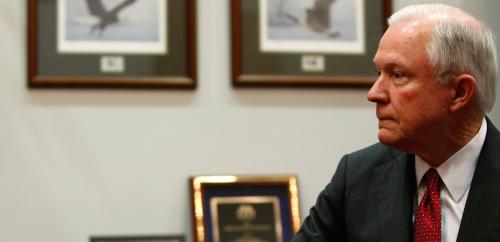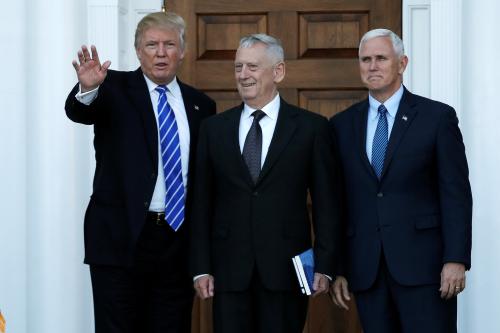Nothing about President-Elect Donald Trump’s candidacy, campaign, election, and transition has been normal. As the confirmation hearings on his Cabinet nominees begin this week, it is prudent for senators and reporters to remember this reality and not fall into the trap of assuming this stage will be different. Trump’s presidency will challenge the strength and resourcefulness of our democratic institutions and the norms that help make them work. Those chosen to fill the highest Senate-confirmed positions in his administration must be more than loyal agents of the President; they perforce will be stewards of our constitutional system, governing statutes, and the civil servants who carry out the essential work of governance. Their confirmation hearings are not simply hurdles to be cleared on the way to assuming office. They are an essential mechanism for reinforcing these responsibilities and setting the terms of accountability for upholding the rule of law.
First up is Senator Jeff Sessions, the President’s choice to serve as Attorney General. No appointment will be more crucial to the workings of the Trump administration and to the character of American democracy during his time as president. The jurisdiction of the Department of Justice is vast—touching all aspects of the enforcement of federal law and the administration of justice in the United States. Civil rights, voting rights, immigration, and national security law will be at the center of legal and policy disputes and the focus of intense partisan battles.
Sessions, the first senator to publicly support Trump’s presidential candidacy and an enthusiastic supporter of his strongly restrictionist position on immigration and hostility to past trade agreements, was a natural choice for Trump but also a very controversial one. Sessions’ experience and knowledge of the substantive work of the Department, unlike a number of other Trump appointees, are vast. His years spent as a federal prosecutor and state attorney general in Alabama followed by two decades of service on the Senate Judiciary Committee would appear to qualify him for this critical post.
The controversy arises from both the history that preceded his election to the Senate and to the ideological space on the far right that he has occupied since his arrival in Washington. That early history was recounted during his confirmation hearings on his nomination to a Federal judgeship in 1986. His appointment was derailed by a Republican-controlled Judiciary Committee, largely on grounds that he had used racist language in the conduct of his work in Alabama and prosecuted three civil rights activists in conjunction with their efforts to register blacks (in the latter case, the charges that were later rejected by a unanimous jury verdict).
Sessions has enjoyed cordial relations with his colleagues on both sides of the aisle in the Senate while building a substantive record that place him in striking opposition to Democrats and not infrequently many Republicans on a range of matters to come before the Senate. He shares an independent streak with Trump but compensates with a reputation for civility and honesty. On the eve of his confirmation hearings, he has generated much more opposition outside the Senate than within it. Not a single Republican senator has indicated potential opposition and one Democratic senator has already announced his support.
Much of the hearing will likely focus on his pre-1986 record, his controversial positions on immigration, civil rights and voting rights, and his reaction to some of President-Elect Trump’s more outrageous statements during the campaign. It is equally important that senators question his conception of the responsibilities of the Attorney General. What authority does he have over the work of the FBI, the Solicitor General, and the Office of Legal Counsel and when and how would he exercise it? Does he expect a major overhaul of the civil rights division, including its core staff? What guidelines would he apply for the selection of immigration court judges? How would he deal with credible evidence of conflicts of interest by President Trump and members of his family? What statutes and constitutional provisions might be invoked if such evidence were presented? Can he envision circumstances under which he felt an obligation to resign? What is his view of the resignations in the Justice Department during the Watergate “Saturday Night Massacre”? Of the actions of John Ashcroft and William Comey in denying President George W. Bush’s request to certify the legality of an executive order on warrantless surveillance?
Time spent pursuing these matters pertaining to the rule of law would be well-invested especially if, as expected, Senator Sessions is confirmed as the next Attorney General.


![For USA-ELECTION/VOTING-NORTHCAROLINA [moving at 0600 EDT (1000 GMT) Friday, July 15, 2016]A pile of government pamphlets explaining North Carolina's controversial "Voter ID" law sits on table at a polling station as the law goes into effect for the state's presidential primary in Charlotte, North Carolina, U.S. on March 15, 2016. REUTERS/Chris Keane/File Photo - RTSI0CT](https://www.brookings.edu/wp-content/uploads/2017/01/gs_20170123_nc-voter-id.jpg?quality=75&w=500)




Commentary
Confirming Team Trump: Jeff Sessions as Attorney General
January 9, 2017